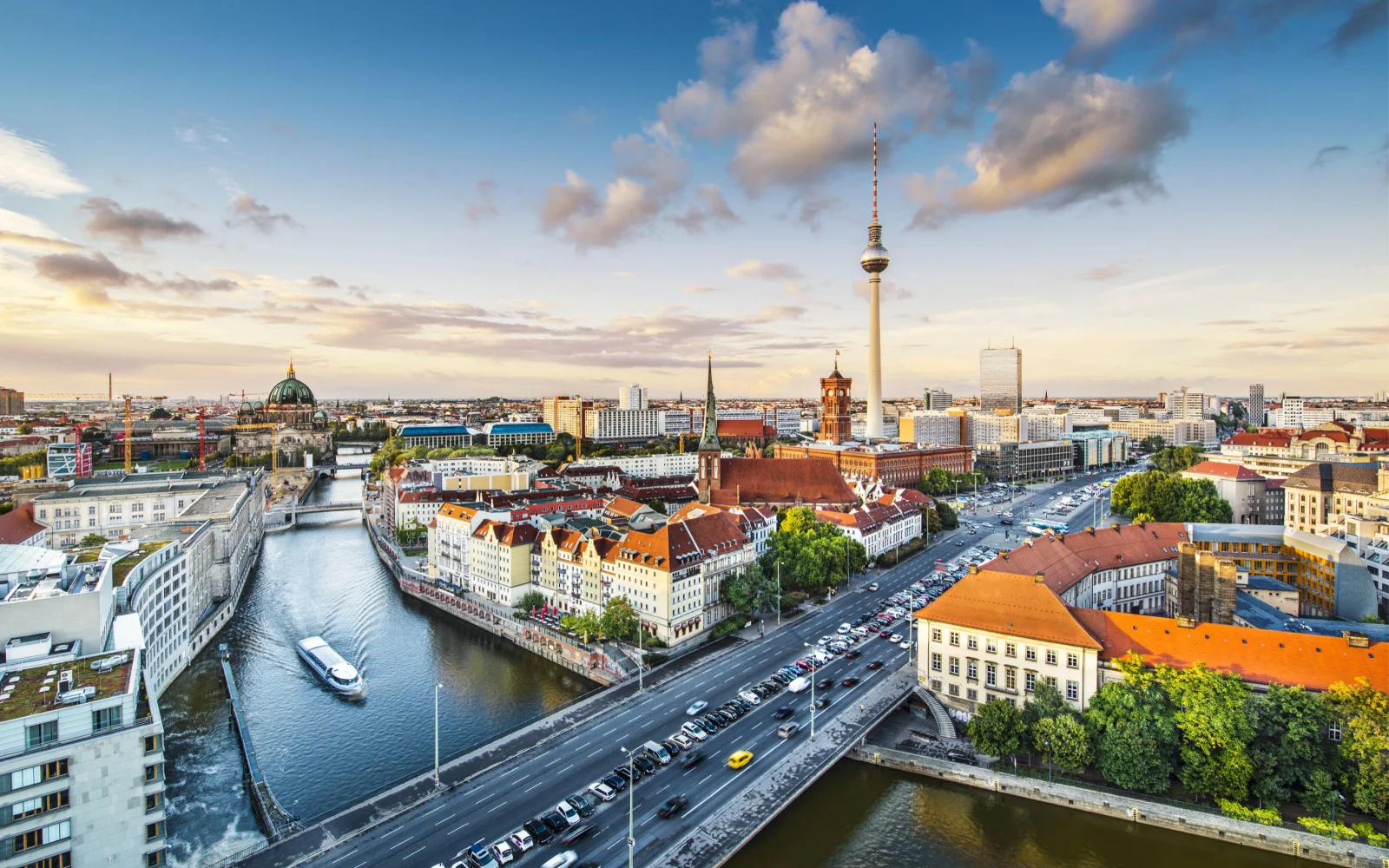Berlin, Germany’s capital, is one of the most popular cities for lovers of history, culture, and nightlife. Over 33 million people visit Berlin each year (and many more visit for day trips).
History lovers can take in important sites from World War Two and the Cold War, such as the Berlin Wall and the Memorial to the Murdered Jews of Europe.
Lovers of culture should visit some of Berlin’s famous museums, such as the Pergamon Museum or the Topography of Terror. Berlin is a very popular city with hip young people thanks to the flea markets, great cuisine, and world-famous techno nightlife.
There is so much to see and do, you might be tempted to book your trip (or plan your move) immediately. However, it’s always a good idea to keep more practical concerns in mind even when you are excited about visiting a new city.
But don’t worry — our travel experts have done the hard work for you by rounding up all you need to know about the most common safety concerns and crimes you might encounter in Berlin. Let us be your guide!
Is Berlin Safe to Visit in 2025?
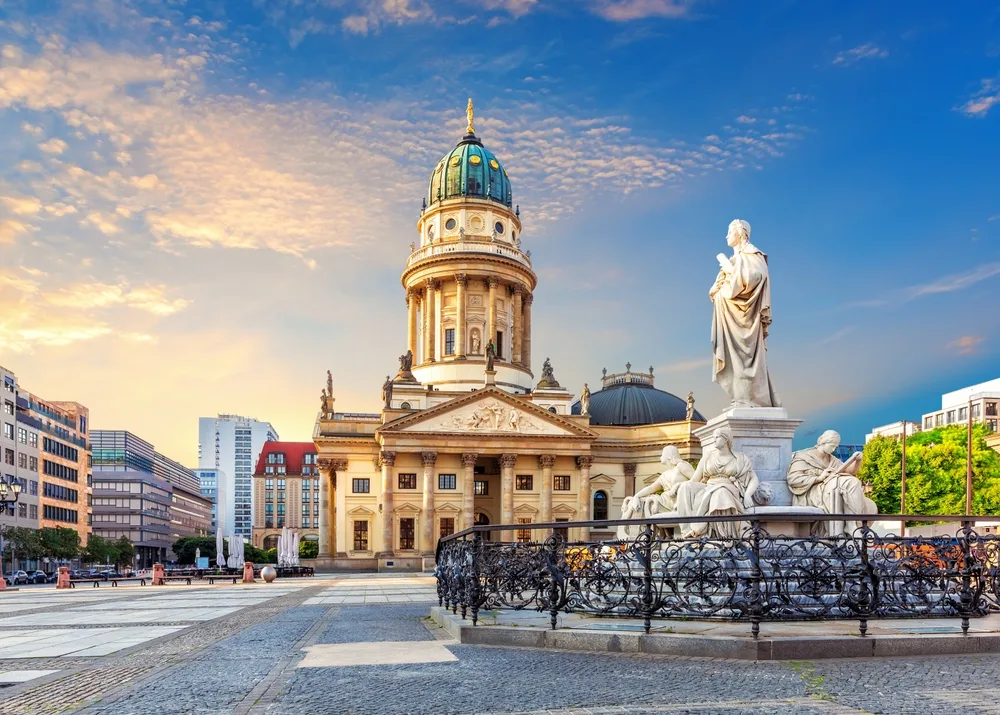
AlexAnton/Shutterstock
Yes, Berlin is safe to visit. Like in any big city, you will have to take precautions against crimes such as pickpocketing and petty theft.
More violent crimes such as assault and terrorism do occur, but they are rare. It’s one of the safest cities in the world because it is in one of the safest countries in the world, Germany.
Most countries such as Canada issue a Level Two travel advisory for Germany due to the risk of terrorism but emphasize that the rate of crime is fairly low.
It makes sense that the rate of crime in the capital is also going to be low if it is fairly low in the rest of the country. The reason most countries have a Level Two travel advisory in place for Germany, and by extension Berlin, is terrorism.
There have been terrorist attacks in the past, such as the August 2020 incident when a terrorist drove a car into a crowd, which the Australian government mentions in its travel advisory.
Although terrorist incidents may grab the headlines, they are actually few and far between in Berlin.
There hasn’t been one since 2020, and there wasn’t an incident for years prior. You should be aware of the threat, but the fear of terrorism doesn’t have to ruin your vacation.
You are far more likely to encounter petty problems in Berlin such as:
- Pickpocketing
- Purse snatching
- Tourist scams
- Robberies
- Drink spiking
All of these problems are fairly easy to avoid with a few precautions. Even if they do happen, the consequences are usually not dangerous, just uncomfortable. Besides crime, you should be aware of the potential for civil unrest in Berlin.
The city is famous as a hotbed for activism, and protest marches are frequent. Although most protests are peaceful, some even joyful, there have been cases where activists clash with police.
Violent incidents often erupt during May Day protests or other events such as the recent protests against the arrest of an antifascist activist.
The city sometimes experiences strikes. For example, during the spring of 2023, all flights in Berlin’s airport were canceled due to strikes by the transportation union.
The union might still announce strikes, so read up ahead of time about the risk of strikes and try to make alternate travel plans in case of cancellations.
Crime in Berlin
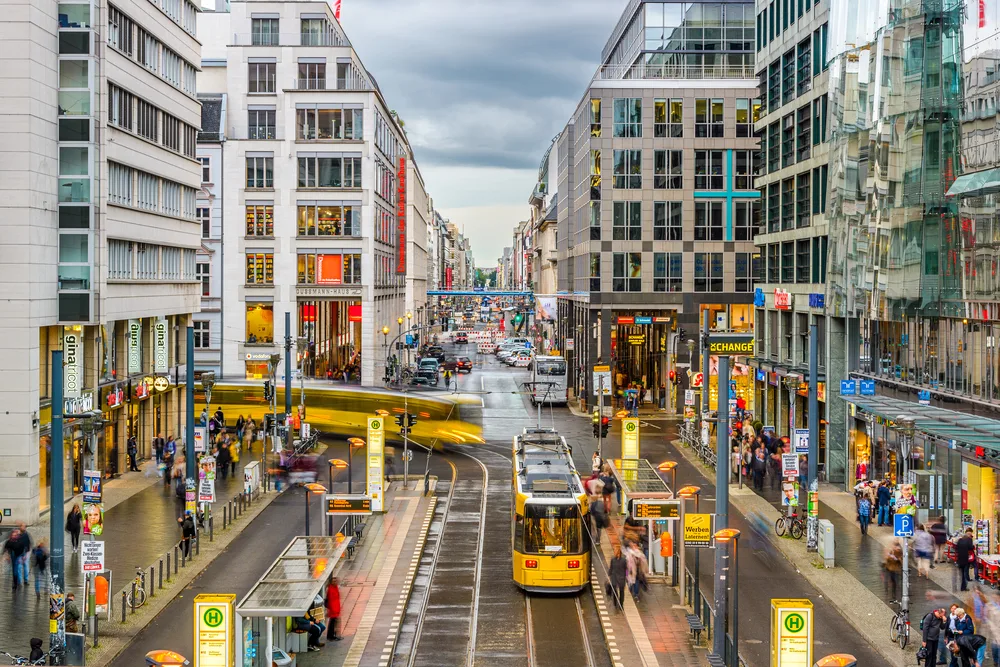
BERLIN – SEPTEMBER 16: Friedrichstrasse Shopping Street September 16, 2013 in Berlin, Germany. Thou once bisected by the Berlin Wall, the area has been rejuvenated since the early 1990’s/ESB Professional/Shutterstock
Crime is a primary concern when visiting any big city, and Berlin is no different. As the capital and biggest city in Germany, it also has the most crime in the country.
According to a regional breakdown of crime in Germany, Berlin has the highest crime rate at 13,330 incidents per 100,000 people. There are a few reasons why it has the highest crime rate in Germany.
It simply has the biggest population, and whenever a lot of people live on top of each other, crime can occur. Berlin is also a city with many social factors that lead to crime, such as high levels of homelessness, social inequality, and ethnic segregation by neighborhood.
However, the city’s crime rates are comparative to what you would expect for any big city in Europe. In fact, Berlin is actually safer than many other big cities on the continent, such as Paris.
According to Numbeo, it scores a 46.62 out of 100 on the crime index, which is a moderate value. The good news is that residents are most worried about petty crime such as verbal harassment, drug abuse, vandalism, and petty theft.
Few people report violent crime as a regular cause for concern. Most people feel safe walking around Berlin during the day and at night.
In 2022, there was a much-publicized rise in crime in Berlin. Much of this rise was because crime dropped drastically during the COVID-19 lockdowns, but some crime increased beyond pre-pandemic levels.
This included theft, which increased by 20%, a 19% increase in knife crime, and a 20% in youth crime. Still, crime rates seem on track to stabilize in 2023. Like any big city, Berlin has its problems.
Occasionally, these problems even turn violent. However, most violent crimes affect locals, not tourists. They also rarely occur in areas that tourists are likely to visit and are usually confined to poorer areas on the outskirts of the city.
What do these crime statistics mean for visitors? Berlin is a beautiful city, but it’s important to remember that it is a big city and that you should take the same precautions you take in any big city.
You may be on vacation, but criminals are not. However, you don’t have to be on your guard constantly because more dangerous incidents are rare.
Petty Theft
The most common crime you will encounter in Berlin is petty theft. Petty thefts such as pickpocketing, bag snatching, and phone theft are common in most big cities in the world, although more violent crimes tend to be more reliable headline grabbers. Berlin is no different.
Petty theft can occur in crowded areas and places popular with tourists. Be careful at popular Berlin locations such as the Brandenburg Gate and Alexanderplatz, as these often attract pickpockets.
Public transportation is another hotspot for pickpockets, so be careful on the U-Bahn and S-Bahn. Street crime rates increase at night, so be careful with where you move around after dark.
The official Berlin tourist board put together some safety tips for visiting Berlin and making sure that you leave with all of your valuables intact.
Most of these tips are common sense advice that you probably implement without thinking in your hometown but might forget when you are on vacation. Make sure that you are not making yourself a likely target for pickpockets and purse snatchers.
Don’t make yourself look like a lucrative target by handling large wads of cash or wearing expensive jewelry. Try to walk with a purpose, and step into a store to look at directions if you get lost.
Berlin residents are a fairly diverse bunch, so you don’t need to worry about dressing a certain way to fit in with the locals (besides American baseball caps and other stereotypical gear).
You should also take extra care that your valuables are never left unattended.
Never let your bag drape over the back of your chair in a restaurant or hang loosely from your shoulder on a metro platform — that makes it easy to snatch. While the rocking motion of the metro can lull you to sleep, try to resist the pull.
Most thefts on public transportation occur when unsuspecting victims fall asleep on the S-Bahn or U-Bahn. If you do want to take a snooze, make sure that you are with someone that will watch your stuff.
Tourist Scams
Like any other popular tourist destination, Berlin also has its fair share of tourist scams. Some of the most common ones are the same you will encounter in most destinations in the world, such as someone spilling something on you or asking you for a photo.
Any incidents where someone is trying hard to get your attention on the street are usually precursors to a pickpocketing attempt.
Around popular tourist locations such as Alexanderplatz, you’ll commonly see people with clipboards collecting petition signatures.
These are usually scams, and after you sign the petition, they will ask you for a (mandatory) donation. Avoid those people. On public transportation platforms, you’ll often run into people offering to sell you a metro ticket for a lower price than you’ll get at the ticket desk.
These tickets are usually invalid and if you get caught, you will pay a hefty fine to the Berlin authorities. Finally, scammers sometimes pose as police officers to isolate tourists and rob them.
You may get stopped by police officers and asked to show ID in Berlin but be careful if they ask you to follow them somewhere. Always ask to see a police officer’s badge if they stop you.
Avoiding Bad Areas
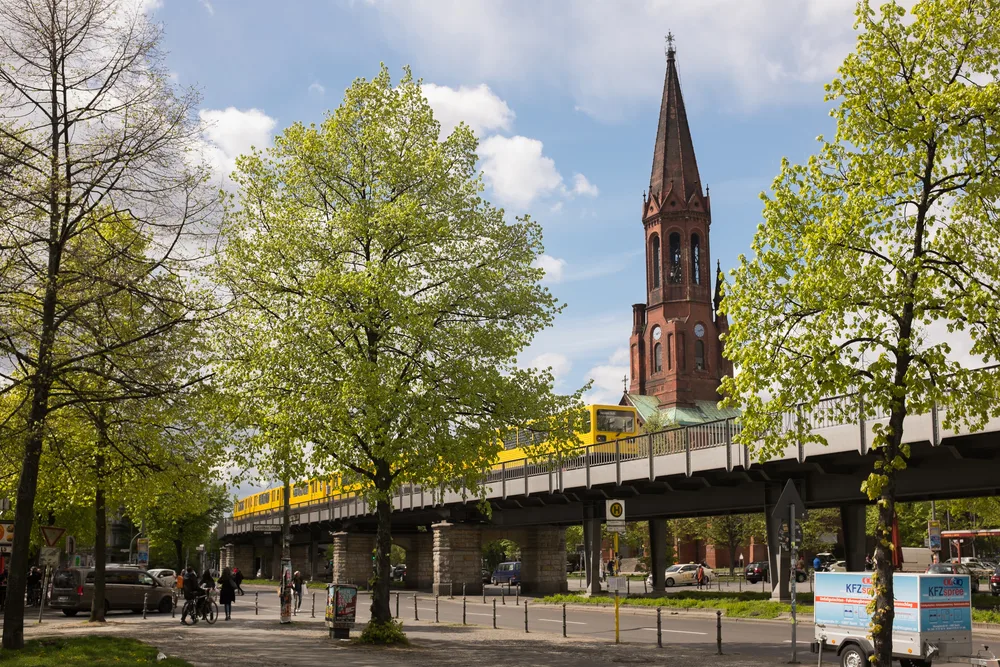
Berlin, April 26th: The Evangelische Kirchengemeinde Emmaus-Ölberg church and the U1 U-Bahn (Subway) near the Gorlitzer (Goerlitzer) Park in Berlin Kreuzberg on April 26th 2017/Hinterhof/Shutterstock
Like any other big city, Berlin has sketchier areas. Some popular tourist destinations in the center become more dangerous after dark due to the presence of drug dealers.
Be careful around Alexanderplatz, Gorlitzer Park, and the train and bus stations at night. Some neighborhoods have heightened neo-Nazi activity and are hostile to foreigners. Be careful in places such as Marzahn-Hellersdorf and Lichtenberg.
Some parts of Neukolln also attract neo-Nazis, even though most of the neighborhood is very diverse. Some parts of Berlin have very high crime rates, such as Leopoldplatz in Wedding and Reuterkiez.
Things to Consider
Here are a few additional safety tips for Berlin:
- Be careful if you are renting a bike. Bike theft is common in Berlin, so lock up your bike wherever you go.
- Avoid taking drugs. Berlin has a hedonistic reputation due to its vibrant nightlife, and many club visitors take drugs so they can stay out until the morning. However, many drugs you buy on the street are laced and you could have an adverse reaction. Plus, there’s always the risk of getting caught.
- Don’t break the rules in Berlin. The law is very strict — and you could be publicly shamed by people around you. Don’t try to ride the metro without validating your ticket. Don’t jaywalk as you might get yelled at by a Berlin grandmother for being a bad influence.
- The city has a large homeless population. Homeless communities often gather around public transportation stations and in parks. Most homeless people are harmless but be aware that you might encounter them on your explorations of the city.
Frequently Asked Questions
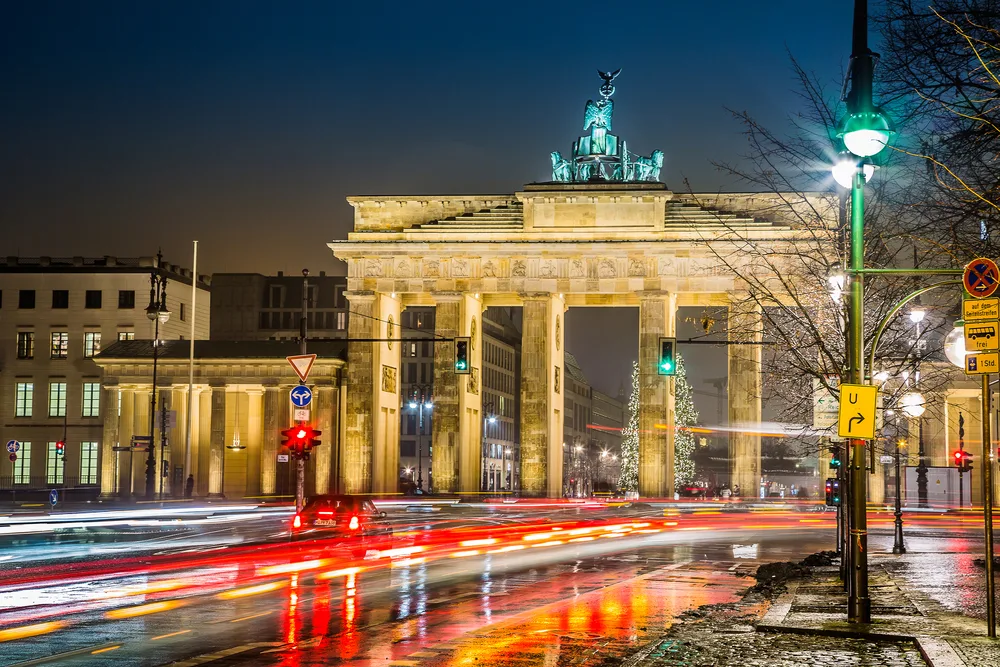
BRANDENBURG GATE, Berlin, Germany at night. Road side view/Sergii Figurnyi/Shutterstock
Here are a few common questions you might want to answer before heading to Berlin:
Is it safe to walk around Berlin at night?
The answer depends on where in Berlin you are walking. Most popular streets are safe to walk around as they are full of other people and police officers. However, be aware of walking down poorly lit side streets, parks, or any areas that your instincts tell you are dangerous.
Is Berlin safe at night alone?
Some areas of Berlin are safe at night, even solo. However, you are more at risk of being the victim of a crime, especially if you are a woman, if you walk around alone, so try to go with a group.
Is it safe to walk alone in Berlin?
During the day, it is safe to walk alone in Berlin. However, at night, you are more vulnerable to robbery if you walk into a sketchier area.
Is Berlin an expensive city to visit?
Berlin is becoming one of the most expensive cities in Europe to visit due to rising prices in accommodation and other items. However, if you budget carefully, stay further away from the center but near a metro line, and avoid expensive activities such as clubbing, you can travel to Berlin on a budget.
What is the safest part of Berlin?
Many of Berlin’s neighborhoods are actually quite safe. Some of the safest are Spandau and Charlottenburg-Wilmersdorf.
Book Your Trip to Berlin Today!
Berlin has its problems, just like any city. However, it is a safe place to visit, and most visitors have a great time (as long as they keep a close eye on their valuables). Happy travels!



